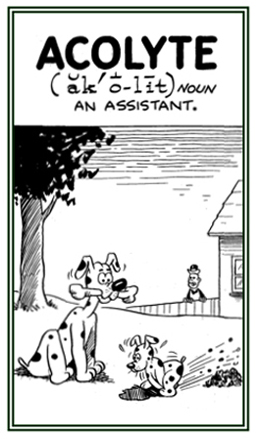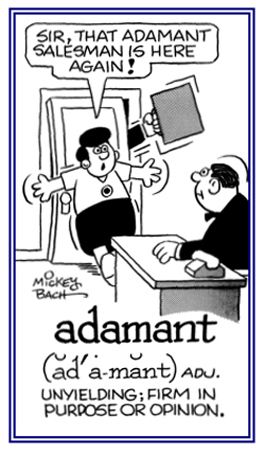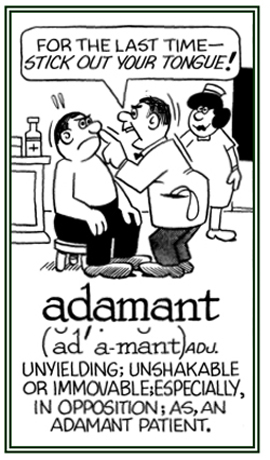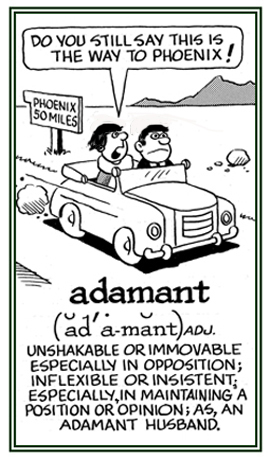English Words in Action, Group A
(a variety of English words which have developed through history and are currently used in our modern age)
Simply click on this banner (or the following link) and you will be on your way to stimulate your brain for greater word comprehension with quizzes based on some of the words in this unit.
Ability is a special skill, like speaking several languages, or keeping your mouth shut in one language.
Laureen Logan is one of the ablest lawyers who is qualified to defend Harley in the misdemeanor trial.
2. Descriptive of a physical or mental condition: The starving man was barely able to walk.3. Having the necessary means to do something: Because of the bankrupt situation in Reginald's country, he didn't know how he would be able to survive during his retirement.
Einstein is said to have had an abnormal IQ.
2. Descriptive of something that is unusual: An abnormal amount of snow fell in October.Abnormal can mean either below or above normal, either better or worse than normal; while, "subnormal" always means below or worse than normal.
3. Etymology: from anormal which came from the Greek anomalos, "irregular". Later the b was added by analogy with the Latin word for irregular, abnormis, based on Latin ab-, "from" + norma, "norm"; hence "away from the norm".2. Living quarters or places where people reside or have their homes: Now, there are actually those even in these modern times who have their abodes in refurbished caves.
Cave Living? Cool! Welcome to the modernized cave abode.
In sun-baked Spain, locals and vacationers are discovering the allure of an abode in cave homes.
- Are you a lover of "One Million Years B.C." and cheap, environmentally friendly homes? Then take heart: cave abiding is making a comeback.
- Down in southern Spain, Spaniards and foreigners are buying and refurbishing century-old caves and turning them into modern homes.
- These aren't your dank, caveman-movie grottoes.
- They're dry and whitewashed clean, and they have windows and all the modern conveniences; including, electricity, running water, telephone, cable, and parking.
- Most of them maintain an even temperature of 15.5 to 21 degrees Celsius (59.9 to 69.8 degrees Fahrenheit), winter and summer, without sending a single carbon molecule skyward.
- People have lived in caves worldwide and throughout history and the Spanish caves are recent and not natural in origin because local people carved most of them out of soft gypsum and limestone hillsides over the past 200 years.
- Earlier they were homes for poor agricultural workers and they reached their height of popularity in the late 19th century and then they started to be abandoned in the mid-20th century as the workers moved into the cities.
- Typically the caves range from 45 to 185 square meters (500 to 2,000 square feet), with front rooms built out from a hillside and windowless interior rooms that are more cave like.
- It used to be that the rich lived in the villages and the poor in the caves, but now it is reversed with the rich being the ones who have made the caves their new abodes.
2. To cause the end or termination of something: The astronauts aborted the space flight when the engine of their space ship caught fire. 3. Etymology: from abortus, a form of the Latin verb abortare, "to disappear"; formed from ab, "away" + oriori, "to come into being, to appear".
The demonstrators are opposed to abortions.
2. The inability to achieve that which was planned or started; a failure: The attempt to reorganize the objectives of the project resulted in an abortion of the next scheduled meeting.2. To exist in great quantities or numbers; to be prevalent: The English language abounds with exact, vigorous, and colorful words to express all kinds of meanings.
3. Etymology: from Latin abundare, "to overflow" from ab-, "from" + undare, "to flow"; from unda, "a wave".
Yesterday, Grover was fishing in a stream that abounded in fish.
2. A person with a scholarly background or attitudes: The teacher's academics inspired her students to strive for a greater knowledge and experiences in the field of linguistics.
2. Theoretical rather than practical: It is amazing how much heat the intercollegiate debate aroused; after all, the importance of the French Revolution is now only an academic question.
The source of the terms academy, academic and related words
On the outskirts of ancient Athens there was a grove sacred to the hero Akademus. In this park the philosopher Plato established his school or college in about 385 B.C. Both the garden and the school were called Akademia after the name of the hero.
The English words academy, academic, academician, academical and others from that family of words are derived from the name of Plato's school.
The term academy is now applied to institutions of higher learning, secondary schools, or any place where special subjects, arts, and skills are taught, so we have military academies, riding academies, fencing academies, dancing academies, and even billiard academies.
The meaning of the word has also been extended to include societies of learned people who have united to advance learning, literature, the arts, and the sciences; such as, the French Academy, the National Academy of Sciences, and the Academy of Motion Picture Arts and Sciences.
2. Someone who helps the person who leads a church service or assists the celebrant in a religious service or procession: The acolytes of the priest were helping him prepare the various aspects needed for the church service.
3. Etymology: directly or via Old French, from ecclesiastical Latin acolytus; from Greek akolouthos, "follower, attendant", from a-, "together" + keleuthos, "path".

Go to this Word A Day Revisited Index
so you can see more of Mickey Bach's cartoons.
2. Refusing to be persuaded or to change one's mind: The Chief Executive Officer of the company made an adamant refusal to resign his position.




Go to this Word A Day Revisited Index
so you can see more of Mickey Bach's cartoons.
Links to all of the groups of English words in action, Groups A to Z.
You may see the bibliographic list of sources of information for these words in action.


